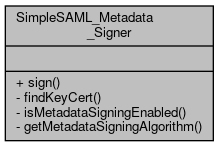 Collaboration diagram for SimpleSAML_Metadata_Signer:
Collaboration diagram for SimpleSAML_Metadata_Signer:Static Public Member Functions | |
| static | sign ($metadataString, $entityMetadata, $type) |
| Signs the given metadata if metadata signing is enabled. More... | |
Static Private Member Functions | |
| static | findKeyCert ($config, $entityMetadata, $type) |
| This functions finds what key & certificate files should be used to sign the metadata for the given entity. More... | |
| static | isMetadataSigningEnabled ($config, $entityMetadata, $type) |
| Determine whether metadata signing is enabled for the given metadata. More... | |
| static | getMetadataSigningAlgorithm ($config, $entityMetadata, $type) |
| Determine the signature and digest algorithms to use when signing metadata. More... | |
Detailed Description
Definition at line 10 of file Signer.php.
Member Function Documentation
◆ findKeyCert()
|
staticprivate |
This functions finds what key & certificate files should be used to sign the metadata for the given entity.
- Parameters
-
SimpleSAML_Configuration $config Our SimpleSAML_Configuration instance. array $entityMetadata The metadata of the entity. string $type A string which describes the type entity this is, e.g. 'SAML 2 IdP' or 'Shib 1.3 SP'.
- Returns
- array An associative array with the keys 'privatekey', 'certificate', and optionally 'privatekey_pass'.
- Exceptions
-
Exception If the key and certificate used to sign is unknown.
Definition at line 25 of file Signer.php.
References $certificate, $config, $ret, and $type.
Referenced by sign().
 Here is the caller graph for this function:
Here is the caller graph for this function:◆ getMetadataSigningAlgorithm()
|
staticprivate |
Determine the signature and digest algorithms to use when signing metadata.
This method will look for the 'metadata.sign.algorithm' key in the $entityMetadata array, or look for such a configuration option in the $config object.
- Parameters
-
SimpleSAML_Configuration $config The global configuration. array $entityMetadata An array containing the metadata related to this entity. string $type A string describing the type of entity. E.g. 'SAML 2 IdP' or 'Shib 1.3 SP'.
- Returns
- array An array with two keys, 'algorithm' and 'digest', corresponding to the signature and digest algorithms to use, respectively.
- Exceptions
-
SimpleSAML\Error\CriticalConfigurationError
- Todo:
- change to SHA256 by default.
Definition at line 162 of file Signer.php.
References $config, and $type.
Referenced by sign().
 Here is the caller graph for this function:
Here is the caller graph for this function:◆ isMetadataSigningEnabled()
|
staticprivate |
Determine whether metadata signing is enabled for the given metadata.
- Parameters
-
SimpleSAML_Configuration $config Our SimpleSAML_Configuration instance. array $entityMetadata The metadata of the entity. string $type A string which describes the type entity this is, e.g. 'SAML 2 IdP' or 'Shib 1.3 SP'.
- Returns
- boolean True if metadata signing is enabled, false otherwise.
- Exceptions
-
Exception If the value of the 'metadata.sign.enable' option is not a boolean.
Definition at line 124 of file Signer.php.
◆ sign()
|
static |
Signs the given metadata if metadata signing is enabled.
- Parameters
-
string $metadataString A string with the metadata. array $entityMetadata The metadata of the entity. string $type A string which describes the type entity this is, e.g. 'SAML 2 IdP' or 'Shib 1.3 SP'.
- Returns
- string The $metadataString with the signature embedded.
- Exceptions
-
Exception If the certificate or private key cannot be loaded, or the metadata doesn't parse properly.
Definition at line 219 of file Signer.php.
References $config, $type, $xml, findKeyCert(), SAML2\DOMDocumentFactory\fromString(), SimpleSAML\Utils\Config\getCertPath(), SimpleSAML_Configuration\getInstance(), and getMetadataSigningAlgorithm().
 Here is the call graph for this function:
Here is the call graph for this function:The documentation for this class was generated from the following file:
- libs/composer/vendor/simplesamlphp/simplesamlphp/lib/SimpleSAML/Metadata/Signer.php




